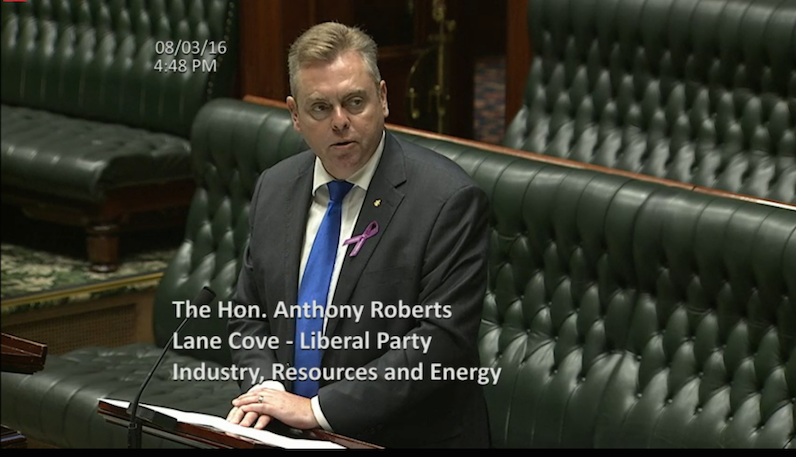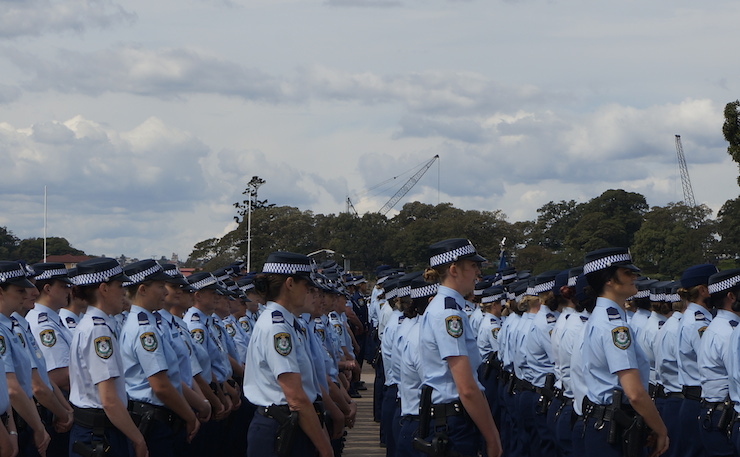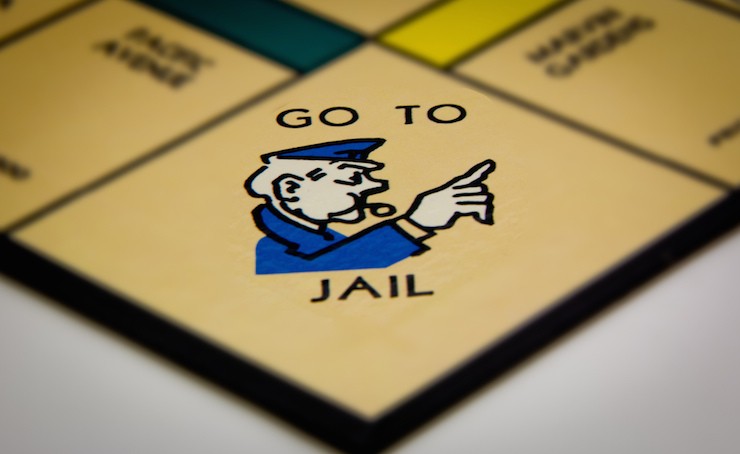The Baird government’s new laws to “crack down” on civil disobedience were unveiled in the NSW Parliament this afternoon, and experts are warning that they could substantially curtail the general right to protest and unnecessarily increase already vast police powers.
In his second reading speech, Energy and Resources Minister Anthony Roberts said that Baird was delivering on a promise he made at a mining industry dinner in November 2014 to “throw the book” at protestors who break the law.
However it’s clear the laws do much more than criminalise civil disobedience.
“What it really means its that there are no limits on the right of police to make directions for people to move on at a protest,” said Pauline Wright, who chairs the New South Wales Law Society’s Finance, Environmental Planning and Development and Criminal Law Committees.
“If you haven’t got a permit for the protest or the rally then you can be told to move on and given directions, and if you don’t obey those directions then you’re committing an offence,” Wright said.
“So it’s criminalising behaviour that should not be criminal as such.
“Things should only be criminal when they’re actually causing trouble: A peaceful protest should never be criminal as long as it’s not harming anyone else or causing real danger.
“The police have already got the ability to move people on if there’s danger to anybody or if they [believe] that an offence is about to be, or is being, committed.”
With the caveat that the laws were only tabled late this afternoon, and she’s not had a chance to thoroughly examine them, Wright said “the immediate response is that there’s already sufficient laws in place that would prevent anything that’s actually unlawful going on, such as criminal damage, trespass, obstruction, [and]that sort of thing”.

Aidan Ricketts, a law lecturer at Southern Cross University who specialises in protest laws and activism, added that the proposed laws “elevate mining and petroleum industry – big donors – above all other property owners in relation to trespass laws”.
The bill introduces a new ‘aggravated’ category to the offence of entering inclosed lands, pushing penalties for illegally accessing mining companies’ facilities or land associated with their operations up to a maximum of $5,500, which is ten times the usual $550 fine for trespass.
This favourable treatment comes the day after the Sydney Morning Herald revealed that the Baird government is simultaneously reducing the penalty for coal seam gas companies which explore or mine without permission, down from $1.1 million to just $5,000.
That’s less that the potential fine for trespassing on property those companies have an interest in. “It’s hard to see why the property and operations of mines are dealt with as special citizens,” Wright said.
“In a sense the rule of law should apply to everyone equally and if it’s an aggravated offence to stop people from interfering with mining equipment, why is it not aggravated in some other circumstance. It’s hard to see how that can be justified,” she said.
The bill also grants extraordinary new powers to police.
Officers would be empowered to search people without warrants and seize property.
The only limitation in the bill is that an officer must believe the object is “intended to be used to lock-on or secure a person to any plant, equipment or structure for the purpose of interfering with the conduct of a business or undertaking and that is likely to be used in a manner that will give rise to a serious risk to the safety of any person”.
“The bill provides for confiscation of property on the basis of a mere suspicion of intended use. This could well include the tools of any farmers, tradesmen or other persons who attend a protest [and]seized goods are specifically not able to be reclaimed by the owner,” Ricketts said.
There are two exceptions to these search and seizure powers: Industrial disputes, and “apparently genuine” protest actions.

“There’s a lot of discretion given to a police officer firstly in deciding whether it is ‘an apparently genuine demonstration,’ and in deciding whether it’s reasonably necessary to deal with a ‘serious risk to safety’,” Wright said.
“There’s got to be some kind of objectivity as to whether that was reasonable but it still leaves a lot of discretion in individual police officers’ hands as to whether it was or wasn’t risky. It’s a question of ‘how big does the risk have to be’?
“What it can do is as soon as you provide that level of discretion to police officers who are under pressure on the day, they ask someone to move on; there’s an argument as to whether that’s reasonable or not at the scene; that then becomes obstructing police officers in the exercise of their duty; it might become offensive language; it might become resisting arrest; and you’ve suddenly got an escalation in the situation.”
Ricketts said that the powers being handed over to police to protect the interests of mining companies from peaceful protest action are part of a broader trend across the nation, and one which is deeply worrying.
The Baird Government laws are similar in many respects to reforms that have been implemented or are underway in Western Australia, Victoria and Tasmania.
“Civil and political rights have a long history in international law, international treaties, and in bills of rights, and nowhere do you find this supposed right to do business that trumps civil and political rights and normal democratic rights,” he said.
“Certainly I would say it’s an invention of State Premiers in the last 18 months,” Ricketts said.
Donate To New Matilda
New Matilda is a small, independent media outlet. We survive through reader contributions, and never losing a lawsuit. If you got something from this article, giving something back helps us to continue speaking truth to power. Every little bit counts.





